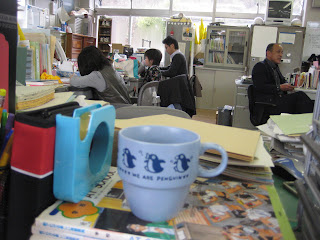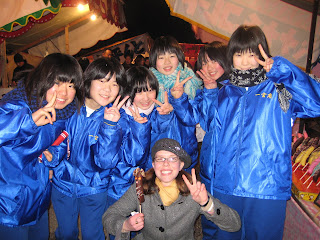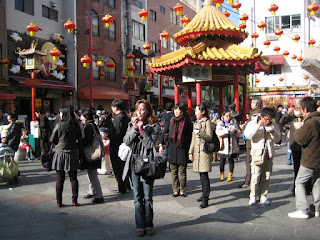Recently, I re-took in Disney’s jewel of intercultural eye-opening experiences, Pocahontas. And I’ve been thinking a bit about “cultural sensitivity.” What exactly is that, and what does it mean?
And I’d like to preface this with the (ironic?) disclaimer that these are just my own opinions and don’t represent the opinions of any group whatsoever. They’re just how I personally deal with the world and are not meant to imply that you should deal with the world in like fashion.
So I live in a country that is really far away from where I grew up. I mean that mostly just geographically. But culturally, too, this place is different. There are customs that just crop up, some of which I really like and can get behind, and some of which I feel make no sense at all.
Part of my job is to be a cultural representative of the US. I think it might even be in my contract. “Try to show Japan a good side of America.” right? God, I hate generalizations.
I had a mission once, before I even arrived probably. It might have won me the job, when my gung-ho spirit at the interview told them I wanted to be polite, be good in Japan, so that people would see that Americans can be polite, as well as whatever else they are seen as being.
But, um, I’m an American; I’m not America. I’m polite, it turns out, because that’s just how I roll. Because I’ve caught more flies with honey. Because trying to be charming always got me what I wanted. Not because it’s American, and not because it’s Japanese. I observe and imitate because I want to fit in. I enthusiastically join unfamiliar customs because I like to learn and try new things. And, because often enough, I really like the customs I am learning.
I’m not really doing it for them.
And to me, that’s a significant distinction. It’s important to me to feel like my actions and responses are fairly organic, that they are genuine because they arise out of a true desire to be or do something, not just to prove some point or provoke a certain response.
I’m not entirely comfortable with the assertion that the burden is always on me, who come from power and privilege, to make an extra effort to understand and adapt.
On the one hand, it’s a total no-brainer. Yeah I better adapt if I don’t want to starve or be restricted to the tiny world of foreigners and their imported food.
But to me, it’s not a burden. It’s an opportunity. I didn’t come here to not see a whole new country and experience a whole different thing.
Mostly, I have an issue with the classification of me being the privileged one. Okay, first let me assure you I actually am quite privileged. I was born into a wonderful family, I just ‘happened’ to live in a great public school district, I have the fortune of knowing a lot of great friends and having a lot of great opportunities available to me. I got to go to Vandy on the blessing of my dedication and brainpower. I got to go to Japan. I’m super-mega-rich, even if not in the fiscal sense. I’m cosmically spoiled.
And also, I was born into an English-speaking family; English just so happens to be in high demand right now. I know these things. I know that by accident of birth, I am sitting so pretty.
But I don’t think it’s being American than makes that so. I think that helps. But Americans live at and below the poverty line too. And some of my students are from families rolling in dough. Some kids in America don’t get attention from their families, don’t get nurtured. Are they privileged? I guess in some ways. But not in others.
I guess I just find it arrogant to insist that being from a powerful country makes me a powerful/privileged person. There are lots of kinds of power, influence, and value, and you can never assess the standing of a group without seeing it through your own personal (and cultural) bias. So to insist that Americans ought to be more culturally sensitive because they are the powerful ones actually relies on (and for me, underlines) the arrogant view that America is somehow superior.
Culturally speaking, no one is.
![]()
Romaji: Juu-nin to-iro
Literally: Ten people, ten colours
Meaning: Everyone has their own tastes; "Different strokes for different folks"
I expect something from myself, in Japan. I don’t owe it to anyone else and I end up just feeling resentment if anyone tries to tell me I do. I expect something from myself in Japan because I am addicted to learning, because I want people to like me, because I know there is much to see and hear and find and in order to do that you have to listen as you go. You can’t be so full of yourself and your own ideas that you overlook all the cool things around you. Or, I mean, you can, but I don’t want to.
In the end, some of the stuff I encounter I will incorporate into my life during my stay. Other things I will keep all my life. And some I will never understand (it’s possible that they really just don’t make sense..!). And that? Is okay.
I think it’s more respectful to be just a little bit demanding. I expect something of myself in Japan, but I expect something of the people I meet, too. I expect that kid in the second row to make a good faith effort to try to learn from me. Which is why I get frustrated when he doesn’t. I expect my co-workers to forgive me when I commit a faux pas at enaki, whether because of my ignorance or just because I am so freaking clumsy. I expect them to be sensitive to the fact that I am learning and want to learn.
Expecting something, demanding something, well that’s the opposite of being patronizing, isn’t it? It may come across as backward to some, but from me, expectation is a sign of deep respect. If I expect something from you, I demonstrate (not just state) my belief in your capacity to provide it.
So I think that JETs are in Japan partly so they can give, and partly so they can need something from the people around them. People are just people. Some stuff is just human. Other stuff is particular, personal. Cultural stuff is just whatever falls in between.
And just to return to Pocahontas for a second, I at first wanted to take major issue with the language thing. In one scene that chick “listens with her heart” and is able to understand what Smith is asking her. So she says “My name is Pocahontas.” And I know it’s just a movie, and they needed to skip over the whole problem of language, but there is no way.
Still, you do gotta listen with your heart.. you gotta want it. No amount of trying to prove anything will substitute.









































